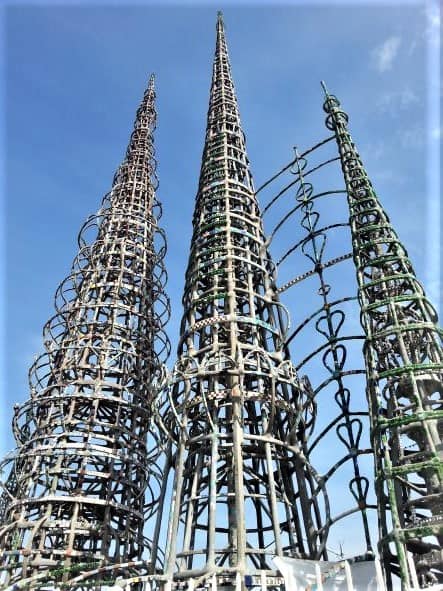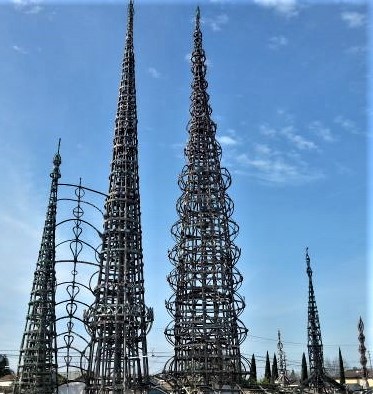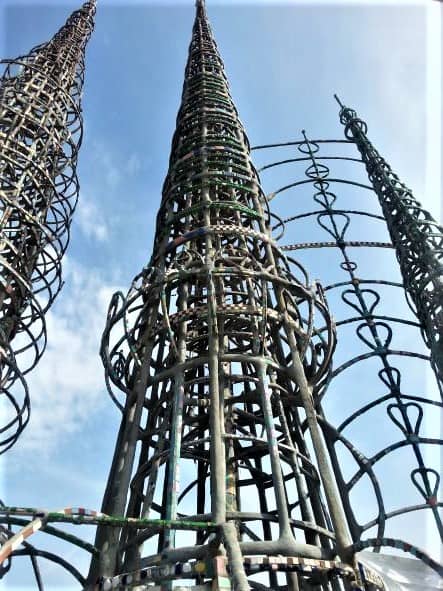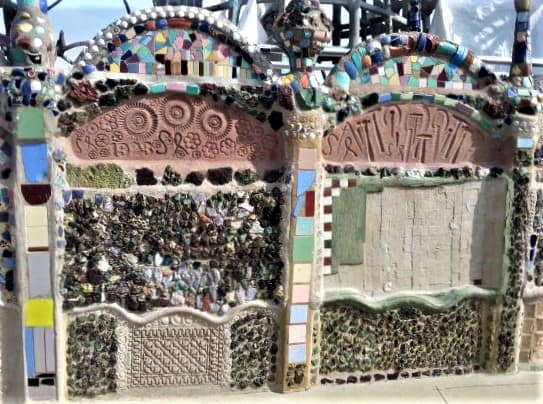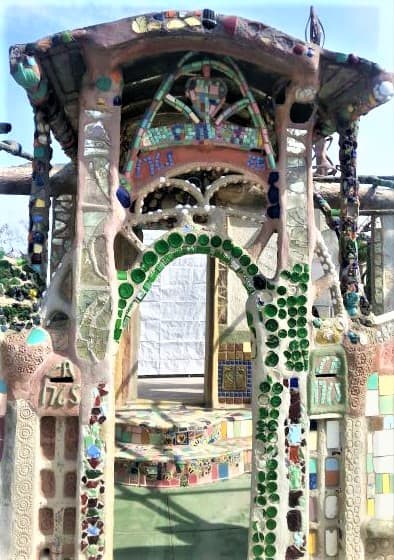In the middle of the Los Angeles neighborhood of Watts is a stunning D.I.Y. structure with a connection to the Beatles most famous album.
Watts Towers origin story
Simon Rodia was an artist born in Serino, Italy. He emigrated to the United States, eventually settling in Watts in 1920.
The next year, Simon began work on what would become the Watts Towers. It took Simon 34 years to complete the project of steel, ceramics and found objects with several towers reaching almost 100 feet in height.
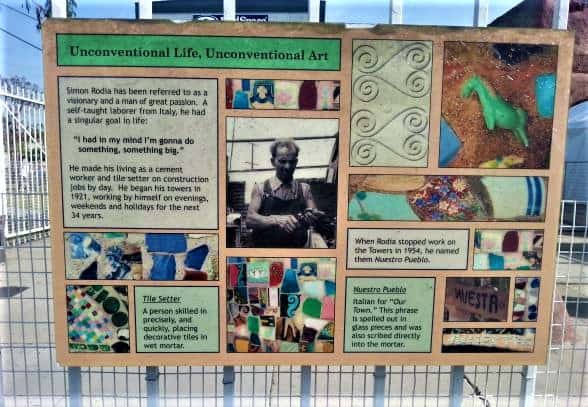
Construction of the Watts Towers
Mr. Rodia was a laborer and construction worker. So, he had the skills to build structures.
Simon built the towers with no plans, no blueprints, and no outside help. The towers were made from steel rebar reinforced with concrete that the artist applied to the steel himself. Eventually, the massive project boasted 17 interconnected towers!
There was no scaffolding to support Simon as the towers grew in height (ultimately to almost 100 feet!). Instead, he used a window washer’s belt to keep him from plunging to a certain demise.
Mr. Rodia decorated the towers with shards of ceramics from his day job at Malibu Pottery. Other found objects like bottles, seashells, and mirrors decorated the towers.
Neighbors in Watts were bewildered by the huge project being constructed. During WWII, some falsely believed that the towers were being used as radio antennae to transmit information to the Japanese Imperial Army. Others made the bogus claim that there was buried treasure on the site.
In 1954, Simon Rodia suffered a stroke and fell from one of the towers. Though not seriously injured, he gave the property, towers and all, to a neighbor and left Watts, never to return. He died in 1965.
Efforts to demolish the Watts Towers
After a fire in 1956, the city of Los Angeles condemned the Watts Towers and ordered them bulldozed. But, the city had difficulty determining ownership of the property, so it sat in limbo.
In 1959, actor Nicholas King and film editor William Cartwright purchased the property and set out to save the towers from the wrecking ball. To this end, they formed the Committee for Simon Rodia’s Towers. By this time, the preservation of the Watts Towers was a cause celebre and the attention surrounding the tower forced the city to pause the planned demolition, but only long enough to perform engineering studies on the structure.
Surprisingly, stress tests on the towers showed them to be structurally sound. In fact, the cranes used to test the integrity of the buildings were damaged from the excessive force exerted on the towers. Because of solid construction of the towers, they are now studied by students of architecture.
Watts Tower preservation
The Committee for Simon Rodia’s Towers raised money and maintained the towers for over 15 years until 1975, when the property was given to the City of Los Angeles and, later in 1978, to the state of California. Today, the towers have landmark status and protection.
Watts Tower Arts Center
Next to the towers themselves is the Watts Tower Arts Center. The center was built in 1970 by the Committee for Simon Rodia’s Towers. It hosts art exhibits and classes for the local community. The center also hosts an annual Drum Festival and Jazz Festival. Tours of the towers are available through the center.
Sgt. Pepper’s Lonely Hearts Club Band
The cover of the Beatles’ LP Sgt. Pepper’s Lonely Hearts Club Band is probably the most famous album artwork in all of rock music. The 1967 cover features the band in their iconic day-glow faux military uniforms with life-size cutouts and wax figures of dozens of famous and not-so-famous individuals. Bob Dylan, W.C. Fields, and Marlon Brando are instantly recognizable. Others, like Aldous Huxley, Tom Mix, and Albert Stubbins were probably only known to a small number of Beatles’ fans.
Simon Rodia definitely falls into the latter camp. No one knows for sure who suggested the image of the outsider artist, but it seems unlikely it came from the band themselves.
Artists Peter Blake and Jann Haworth were brought in to bring the Beatles’ vision to life. After collecting the names of people the band would like to have on the cover (some like Adolf Hitler and Jesus were rejected by the record company), Peter and Jann added some of their own. Since they were fans of Simon’s work, it’s likely they were responsible for his appearance on the cover.
If you have a copy of the LP, look to the left of Bob Dylan; Simon Rodia is there.
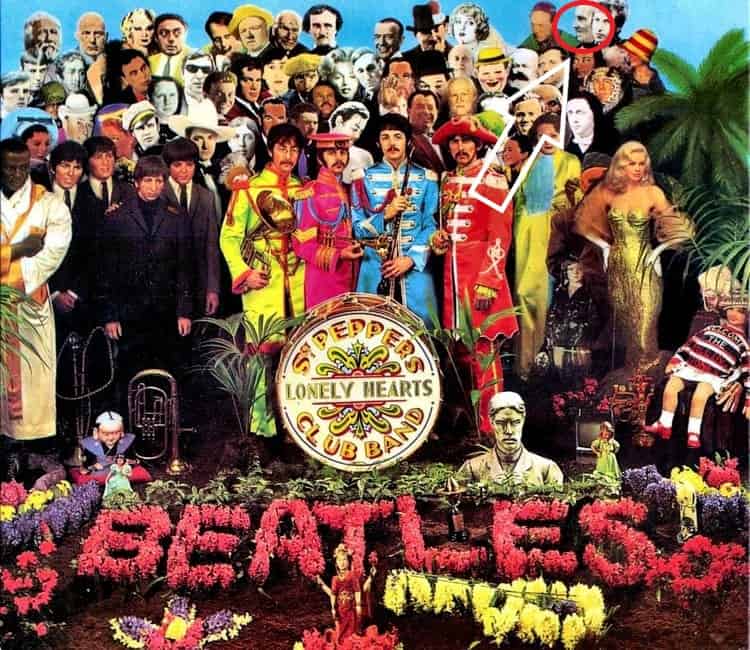
And, if you visit the Watts Tower Arts Center, there is a framed picture of the album unceremoniously tucked in an alcove off the main room.
About the Author

Brent Petersen is the Editor-in-Chief of Destination Eat Drink. He currently resides in Setubal, Portugal. Brent has written the novel “Truffle Hunt” (Eckhartz Press) and the short story collection “That Bird.” He’s also written dozens of foodie travel guides to cities around the world on Destination Eat Drink, including in-depth eating and drinking guides to Lisbon, Porto, Sintra, Monsaraz, and Evora in Portugal. Brent’s podcast, also called Destination Eat Drink, is available on all major podcasting platforms and is distributed by the Radio Misfits Podcast Network.

